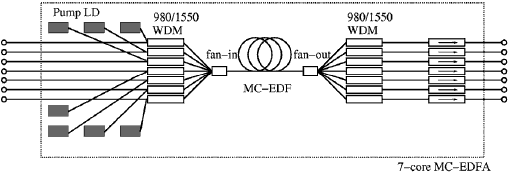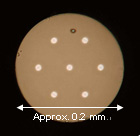September 20, 2012
Furukawa Electric has developed a multi-core erbium-doped fiber amplifier (MC-EDFA)(Note 1) for use with multi-core optical fibers (MCF)(Note 2) that allow seven optical signals to be input simultaneously. We have also achieved substantial energy-savings for optical amplifiers by developing a collective excitation MC-EDFA using our amplifier technologies and connection mechanisms for optical fibers.
Some of this research has been conducted as part of the Commissioned Research for Advanced Telecommunications and Broadcasting Research and Development sponsored by the National Institute of Information and Communications Technology, specifically the Research and Development of Innovative Optical Fiber Technologies (2010 to 2012) program and Research and the Development of Innovative Optical Telecommunications Infrastructure (2011 to 2015) program. Research and development relating to multi-core fibers has been conducted jointly with Tohoku University (Nakazawa Laboratory), while research and development relating to MC-EDFAs has been conducted jointly with Tohoku University (Nakazawa Laboratory) and Tohoku Gakuin University (Matsuura Laboratory), and research and development relating to the multi-core fiber connection technologies used within the MC-EDFA has been conducted jointly with the Chiba Institute of Technology (Nagase Laboratory).
Background
The volume of telecommunications data continues to increase all around the world, as the result of the use of smartphones and other factors, and there are concerns that at this rate the number of devices at relay stations will balloon, as well the amount of electricity consumed. Furukawa Electric has developed a new type of optical fiber(Note 1) that enables multiplexing by having seven paths (cores) inside a single fiber, in order to make this kind of high-capacity optical communication possible. Development of optical amplifiers was essential in order to achieve long distance transmissions using this optical fiber.
Results announced
Furukawa Electric has used its optical fiber and amplifier technologies to develop two types of amplifiers: a seven-core EDFA with good regulation properties where each core is excited individually, as well as an MC-EDFA where all cores are excited collectively. The collective excitation MC-EDFA in particular enables substantial energy savings because, unlike traditional amplifiers, it does not require a separate laser for each individual core.
The seven-core individual excitation amplifier inputs the signal beams and excitation beams into an MC-EDF via a fiber bundle fanout (FDF)(Note 3). The behavior of the MC-EDFA has been verified in transmission tests conducted jointly by KDDI R&D Laboratories (hereinafter "KDDI Labs") and NEC Corporation (hereinafter "NEC") using a configuration where 40 waves of 128 Gbps were sent along a 6160 kilometer MCF transmission route. In these demonstrations, the MC-EDFA achieved a world record 177 petabits-per-second.kilometers, a transmission capacity index expressed as the communication capacity multiplied by the transmission distance.
For the collective excitation amplifier, a spaced coupling system was used to input the signal beams and the excitation beam into an MC-EDFA. At present, performance has been verified for the amplification of up to two cores. We have confirmed that there is almost no increase in power consumption even as the number of cores increases, and that the efficiency of electricity usage improves as the number of cores increases.
Example configuration for the item developed

Future prospects
Furukawa Electric will carry out fundamental research into areas such as lowering power consumption and increasing the number of cores, in conjunction with initiatives directed at developing practical applications for these technologies, with a view to commercialization after 2020, by which time the volume of telecommunications data is expected to come under pressure.
Of this research, we will present reports about the two types of MC-EDFA at the European Conference on Optical Communication (ECOC) to be held between September 16 and September 20 in Amsterdam in the Netherlands. In addition, we will also present a report at the ECOC Post Deadline Paper Session on the results of the transmission tests that were conducted together with KDDI Labs and NEC.
Notes
(Note 1)Multi-Core Erbium-Doped Fiber Amplifier (MC-EDFA):
An MC-EDFA is a type of EDFA(Note 4) that uses multi-core erbium-doped fibers (MC-EDF), which are optical fibers that contain multiple erbium-doped cores. Multiple optical signals can be amplified using a single MC-EDF, thereby making efficient amplification possible.Back to Main Content
(note 2)Multi-Core Fiber (MCF):
A multi-core fiber is an optical fiber that has multiple paths (cores) for signals. Currently seven-core MCFs are the most prevalent, but there are also reports of MCFs with as many as 19 cores. Because each fiber has multiple cores, there are concerns about interference between cores, but we have confirmed that interference can be constrained by maintaining an optimal distance between cores.Back to Main Content

Photograph showing a cross-section of an MCF
(note 3)Fiber Bundle Fanout (FBF):
An FBF is an optical component that enables all of the cores of an MCF to be connected, by bundling optical fibers that are finer than a normal optical fiber. Using FBFs enables MCFs to be connected to all kinds of optical components. Another feature of FBFs is that they result in less coupling loss than other coupling methods, and there is little reflection, which can be source of interference.Back to Main Content

(Note 4)Erbium-Doped Fiber Amplifier (EDFA):
An EDFA is an optical amplifier that uses an erbium-doped fiber (EDF) which has been doped with the rare earth element erbium (Er) into an optical fiber. A significant feature of EDFAs is that they have high efficiency with low noise, because by exciting the erbium ion in the EDF with an excitation beam the signal can be amplified without having to convert it to an electrical signal.Back to Main Content